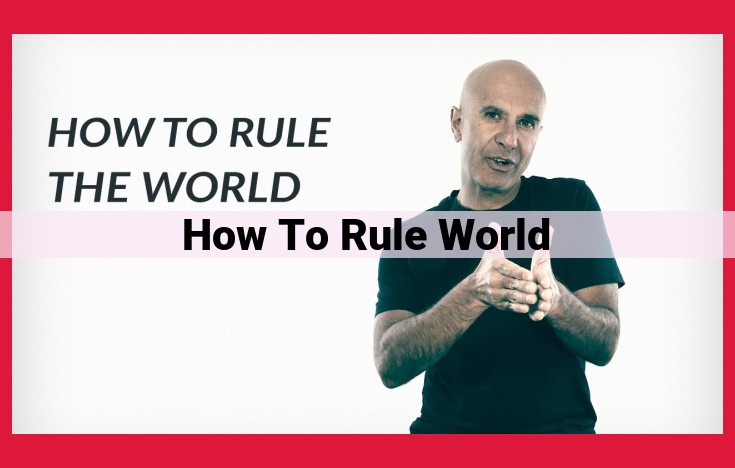- Dictators and governments wield military, economic, and political power.
- International organizations promote global governance and address global challenges.
- Conceptual frameworks analyze historical and contemporary forms of dominance, global governance, and hegemony.
The Role of Dictators and Authoritarian Rulers in Shaping Global Power Dynamics
Throughout history, dictators and authoritarian rulers have played a pivotal role in molding global power dynamics. With an iron fist and a lust for control, these individuals have wielded immense influence through their military might, economic dominance, and political repression.
From the ancient Roman emperors to the modern-day autocrats, these leaders have shaped the course of history through their ruthless tactics and unwavering resolve. Their reign has often been characterized by a concentration of power in their own hands, suppression of dissent, and a willingness to use violence to maintain control.
Military Dominance
Many dictators and authoritarian rulers have relied on military strength as their primary means of asserting their power. By amassing vast armies and stockpiling weapons, they have projected their influence beyond their own borders and forged alliances with other nations based on fear and intimidation. Their military might has enabled them to conquer territories, establish puppet governments, and control strategic resources and trade routes.
Economic Control
Some dictators have leveraged economic power to exert their influence on the global stage. Through control over key industries, natural resources, and financial institutions, they have amass vast wealth and used it to secure economic leverage over other countries. Their ability to manipulate markets, impose trade sanctions, and influence the flow of capital has allowed them to advance their national interests and assert their dominance in the global economy.
Political Repression
Authoritarian rulers often resort to political repression to stifle dissent and maintain their grip on power. By restricting freedom of speech, assembly, and political participation, they create an atmosphere of fear and intimidation that discourages opposition and ensures their continued rule. Their secret police, censorship, and arbitrary arrests serve as constant reminders of the consequences of challenging their authority.
Institutional Players in Global Power Dynamics
In the intricate tapestry of global power, institutional players play a pivotal role in shaping its contours. National governments and their foreign policies wield significant sway over international affairs, driving cooperation and alliances, as well as engaging in economic diplomacy. By forging military and economic partnerships, states can amplify their influence and advance their national interests.
International organizations, such as the United Nations, have emerged as crucial actors in global governance. The UN provides a platform for dialogue and cooperation, facilitating negotiations and promoting resolutions on pressing global issues. Its peacekeeping operations and humanitarian assistance efforts play a vital role in maintaining stability and addressing crises.
The World Bank and the International Monetary Fund are powerful institutions that influence global economic dynamics. They provide financial assistance and policy recommendations to developing countries, shaping their economic trajectories and influencing global trade and investment flows. Through their lending practices and conditionalities, these organizations can exert significant influence on the economic policies and development agendas of nation-states.
Conceptual Frameworks Shaping Global Power Dynamics
Imperialism and Colonialism: A Historical Legacy
Throughout history, imperialism and colonialism have been the dominant forms of power projection, where stronger nations establish control over weaker territories. While the age of traditional colonialism may have passed, its legacy still lingers in the form of power imbalances, global inequality, and resource exploitation.
Global Governance: A Complex Puzzle
With the rise of globalization, the need for global governance became apparent. Multinational institutions like the United Nations, World Bank, and International Monetary Fund emerged to address global issues, from climate change to poverty reduction. However, the effectiveness and limitations of these organizations in shaping global power dynamics remain a subject of debate.
Hegemony: A Disproportionate Influence
Hegemony refers to the disproportionate influence exerted by one state or group over others. It can be achieved through military dominance, economic power, or cultural dominance. Understanding the concept of hegemony is crucial for comprehending global power relations and the dynamics that shape them.
A Historical Journey of Global Power Dynamics
The Roman Empire: A Colossus Striding the World
At the dawn of the first millennium, the Roman Empire emerged as a formidable force, its military might spanning vast territories. Its administrative systems, a marvel of their time, ensured efficient governance over its far-flung domains. And its cultural impact, from Latin to aqueducts, shaped the Western world for centuries to come.
The British Empire: A Global Web of Power
Centuries later, the British Empire ascended to the zenith of global power. Its political dominance extended over vast territories in every corner of the globe. Its economic prowess fueled industrialization and trade. And its military strength ensured its supremacy on the world’s oceans. The legacy of the British Empire continues to shape contemporary global power relations.
The American Empire: A Post-War Leviathan
In the wake of World War II, the United States emerged as the world’s preeminent superpower. Its economic might dwarfed that of all other nations combined. Its military dominance was unmatched, with bases and alliances spanning the globe. And its cultural influence, from Hollywood to American values, permeated every corner of the world.
The Cold War: A Rivalry of Ideologies
The global rivalry between the United States and the Soviet Union during the Cold War divided the world into two competing spheres of influence. The nuclear standoff between these superpowers held the world in a perpetual state of unease. The collapse of the Soviet Union in 1991 ushered in a new era of global power dynamics, with the United States emerging as the world’s sole hyperpower.
